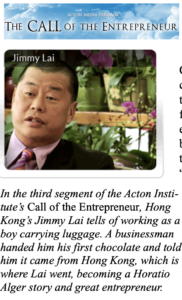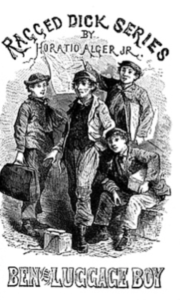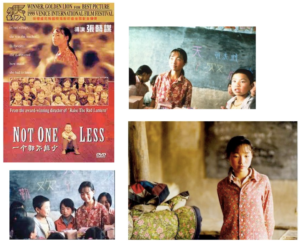Paths to Cities and the Global Economy
It is very good news that hundreds of millions are on the path to prosperity heading to cities for opportunities. Michael Cox used this example: imagine a few people dropped into a jungle, just one having a machete. That tool, like the steam-powered technologies of Western Europe, enables cutting a path through the jungle more quickly. And Cox notes, when other societies find that path, they can run faster to catch up. China, India, Brazil, and Indonesia can skip the century of heavily polluting “dark satanic mills” and instead advance to textiles and light manufacturing adding labor to imported capital and expertise.
Hong Kong entrepreneur Jimmy Lai is in the news, having just been released from jail by the Communist China’s security police. Jimmy Lai is publisher of Apple Daily, a newspaper critical of Hong Kong and Communist Chinese governments. Jimmy Lai was smuggled to Hong Kong by fishermen and became legal when he stepped on Hong Kong soil. His story is told in Call of the Entrepreneur and in A Taste of Chocolate, from Izzit.org, which starts with an introduction by a daughter of U.S. immigrants from Taiwan.
As the poor of the world have finally been allowed (by their governments) to access modern technologies and factories, productivity and wages have increased. Agricultural workers migrate to cities for better paying manufacturing jobs and later to higher-paying service work. And back on the farm, new seeds, skills, machines, and cell phones boost yields while better infrastructure speeds produce to city markets.
Time for More Cities with Better Legal Systems
Paul Romer makes the case for more Charter Cities, more Hong Kongs and Singapores for Honduras and other countries (even Cuba!) (see The Politically Incorrect Guide to Ending Poverty, The Atlantic, July/August, 2010). Hernando de Soto’s Institute for Liberty and Democracy documents the way informal law develops outside state legislation and regulation. Globalization at the Crossroads explains DeSoto’s research that helps governments recognize existing but informal legal norms that facilitate exchange and investment among the poor. ,
These issues matter because places we think of as nation-states–Iraq, Libya, and Syria, for example–were drawn up and left over from colonial times. It is up to tribal regions and cities within the borders of Libya and Syria to decide how they wish to develop as political entities.
Not nation-states but cities are the dynamic engines of economic development. People gathering in cities create ever more gains from cooperation and exchange, from specialization and division of labor, and from cross-fertilizing technologies and enterprises.
Successful cities don’t need to be as big or as prosperous as New York, Boston, London, Paris, or Istanbul, but they do require economic freedom to maneuver around local officials and entrenched elites. Cities like today’s Cleveland and Detroit are burdened with thousands of regulations, licensing restrictions, arbitrary taxes, and corrupt city agencies, and now lack prosperous industries generating enough wealth to cover tax and regulatory overhead.
A century and a half ago, the majority in and around New York City were as poor as in any big city in today’s developing world. But dynamic enterprises allowed millions a much faster escape from poverty.
Bad men and dishonest businesses operate in all societies, always ready to lure and cheat the weak and unwary, and those wishing for high returns for little effort. Horatio Alger’s novels team with scoundrels (much like advertising on today’s talk radio, late-night TV, and the Internet). In exploring the wilderness and clearing land for farms, our ancestors struggled against the forces of nature. But in cities, the natural predators are thieves, swindlers, looters, and bullies: fellow men taking short cuts to the hard-earned income of others.

Young people around the world should be prepared for the many deceptions and cons offered by businessmen and politicians, preying on those wishing too much for too little or thinking they’ve stumbled upon good fortune. Every day we hear of free services promised by the state or get-rich-quick ads on talk radio or in email scams. Similar tricks and deceptions were played daily in 1860s New York City, and Alger’s heroes navigate through them, so readers can learn these lessons at far lower cost.
On the other side of the planet and a century and a half later, the Chinese movie of rural China, Not One Less, tells the touching story of a young girl teaching at a village school. The movie’s realistic portrayal of China’s rural poverty makes clear why tens of millions migrate illegally to cities. The young teacher is warned that her promised pay will be withheld if she allows even one student to run away to the nearby city. 
Not One Less is compelling and holds a surprise at its conclusion. After his “rescue” the runaway boy is driven back from the city and interviewed by TV reporters. They ask about city life (where he was alone and hungry before finding work clearing tables at a small restaurant): “The city was wonderful,” he says, smiling.
Horatio Alger novels should be available in the developing world, and similar local stories should be published. Set in the 1800s in New York City, Ben, the Luggage Boy, in footnotes, cites newspaper articles and interviews with orphaned, abandoned, and runaway boys whose stories are related in the novel.
I expected Alger’s novels to have fanciful “rags to riches” themes (“Horatio Alger stories”). But Alger novels are more often “rags to a new suit” stories. New and even used clothes in the mid-1800s were expensive. Textile mills were lowering prices, but new clothes were still beyond the reach of the poor. (June Arunga remarks, in Johan Norberg’s documentary Globalization is Good, that until recently most Kenyans had only a couple changes of clothes, beyond their “Sunday best.” Cheap imports of used clothing quickly changed that, upsetting local textile firms as well as Nairobi elites who could no longer be sure who was “one of them” and who was merely “masquerading” as well-to-do by dressing elegantly.)
There are keys to success beyond hard work, good fortune, and good clothes. Moving up the ladder turns on the discipline and knowhow to think ahead, save and improve. Forbes has long carried the magazine’s founder, B.C. Forbes, advice to readers: With all thy getting, get understanding.
Higher wages and cheaper food and clothing makes success today both easier to gain and to lose. Most Americans are confident they won’t go hungry or homeless between jobs. But a high savings rate is just as important as it was in Alger’s day. Today’s work week is shorter and work so much easier physically that most Americans now have to set aside exercise time just to keep physically fit and healthy.
However, success still requires struggling upward, maneuvering through bullies, scoundrels, scams, false hopes, and “sure-thing investments” on credit that can quickly wipe out savings and drive people deep into debt.
In Ben, The Luggage Boy, a stubborn ten-year-old runs away to New York City after a fight with his father. Arriving in the city, he looks around for work and learns from other street kids how to earn enough each day, soon settling on carrying luggage. Ben’s memories of his early home life and book-learning gradually fade away. He adjusts to the pleasures of life in the city, with its wide variety of distractions, from occasional cigars to gambling and evening entertainment. Later, an incident motivates “our hero” to start saving and rejoin his family.
What does all this have to do with economic education and economic development today? Consider the numbers: New York City in 1870 was home to over one million (with another 300,000 in Brooklyn). And some 500,000 in New York City were immigrants.
In 2010, New York City was listed as having nearly ten million residents, and 350 cities around the world have populations of over one million. None are as economically free as New York City was in 1860, but now all offer relatively cheap clothes, Internet access, and cell-phones. Increased trade, travel, and international investment, combined with new communications technologies, have opened the door for hundreds of thousands of new textile, light manufacturing, and service enterprises. Teenagers in rural India can advise grandfathers in America how to operate their cell phones and computers (U.S. regulations make it difficult for American teens to provide such services for pay). And communication costs continue to fall, opening wider more windows of opportunity for the world’s urban poor.
Like the many young heroes of Horatio Alger novels arriving in New York City searching for employment, millions today move to global cities looking for jobs and housing. With their eyes, ears, and minds just opening to the diverse exchange economy, many will be able to tap into the the worldwide streams of new ideas and employment opportunities. Every day around the world, enough to fill an 1860s New York City stream into cities, after endless generations of rural poverty. But too few global cities today offer a lamp of liberty to guide the “huddled masses yearning to breathe free.”
 [Jimmy Lai’s story is told in the Acton Institute’s documentary Call of the Entrepreneur and in A Taste of Chocolate, from Izzit.org,
[Jimmy Lai’s story is told in the Acton Institute’s documentary Call of the Entrepreneur and in A Taste of Chocolate, from Izzit.org,
Also see Acton Institute post and podcast: Acton Line podcast: The story of Jimmy Lai’s fight against Chinese oppression (June 24, 2020).
Gregory Rehmke is program director for Economic Thinking, a program of E. Pluribus Unum Films (www.EconomicThinking.org), and coauthor of The Complete Idiot’s Guide to Global Economics.
